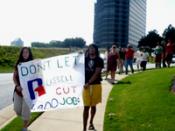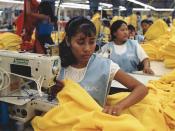Although the United States is advanced in its means of production, businesses and corporations have factories in other countries in which men, women and children are exploited. These workers experience horrible conditions such as: below minimum wage, forced overtime, and many develop life threatening illnesses. As a result of this mistreatment sweatshops are formed. We must counter these sweatshops by boycotting their products and should buy from those companies that don't exploit their workers.
Sweatshops are more than labor abuse; the people that work there have social injustice, poverty, and discrimination. Both men and women are exploited and child labor is present in sweatshops. Men work long hours and don't have time for their wives and families. The women are not home to take care of their children and their household jobs. Children from a young age go to work in order to help their families and don't have a chance to experience childhood.
Clothing companies such as, Adidas, Nike, Gap, Ann Taylor, Abercrombie & Fitch, and J. Crew make money on the expense of these people, therefore, sweatshops are formed (The Email Activist).
The problems with sweatshops is that factories force workers to work long hours for little pay and ignore both the minimum wage and overtime laws. After spending money on daily meals and transportation to work, the average sweatshop worker is left with around eighty cents per day. The workers don't have enough money to cover rent, bills, childcare, school tuition, medicines, and other expenses (Co-op America - Sweatshops). Whenever the sweatshop workers form unions to improve conditions in the factories, the factories close down and move to other locations. Unions are important because they are there to protect workers and provide job security so that there will be no exploitation. The U.S. government can't do anything about these sweatshops because the companies take them to other countries.
Additionally, the illnesses of workers are caused because of the unsafe conditions in factories in which the owners don't care to better the situation. Illnesses such as cancer, asthma, bronchitis, pneumoconiosis, and leukemia occur because the workers are exposed to noxious fumes, organophosphate compounds, and silica dust (Co-op America - Sweatshops). Nikki Bas, executive director of Sweatshop Watch says, "workers should earn a living wage in a safe, decent work environment and that those responsible for the exploitation of sweatshop workers must be held accountable" (U.S. Sweatshop Watch Agency).The sweatshop workers are not provided with any health plans and they can't even afford to pay for it themselves. Healthcare is expensive and in order for the people to be treated they need healthcare. Also, some sweatshop workers develop psychological problems. They feel insecure and worthless. They think that with the pay they get and long hours which they work, that is only what they have to live for and what they are worth.
In order to put an end to sweatshops and make them illegal we have to take some steps. The first and foremost thing we must do is we have to stop supporting the companies which have sweatshops. We can do that by boycotting their goods. Harris Stew strongly points out in his article that, "boycotting is the only means in stopping sweatshops." (27) Anna Yesilevsky portrays a similar point in her article when she writes, "those who assert that boycotting is the correct answer, certainly make a strong emotional appeal. After all, the status of some sweatshops is so dubious as to be called modern slavery by the American Anti Slavery Organization." (20) Therefore, we must buy from those companies that don't exploit their workers and that don't support sweatshops.
By boycotting and making sweatshops illegal we will save the lives of many people and better their conditions. They will no longer get sick due to unsafe conditions and they will get paid at least the minimum wage so that they would be able to pay for their expenses. Families would have the opportunity to spend time with their loved ones and children would have the opportunity to experience childhood.
Works Cited:http://www.coopamerica.orghttp://www.sweatshopwatch.org/http://www.theemailactivist.org/SweatshopsHarris, Stew. Students against Sweatshops, Multinational Monitor, Jan/Feb2001, p27. Academic Search Premiere. EBSCO. City Tech Library. October 22, 2005http://search.epnet.com/login.aspx?direct=true&db=aph&an=4036118Yesilevsky, Anna. The Case against Sweatshops, Humanist May/Jun2004, p20-46. Academic Search Premiere. EBSCO. City Tech Library. November 2, 2005 http://search.epnet.com/login.aspx?direct=true&db=aph&an=13125779





